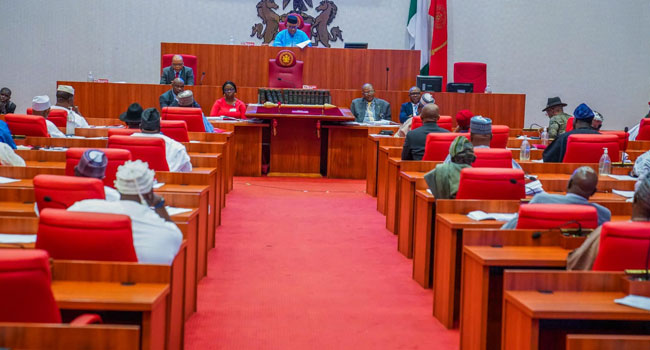AfriqueCAN: THE Nigerian Senate at its plenary on Thursday raised the maximum punishment for drug offences from life imprisonment to death sentence www.AfriqueCAN.com
The legislation titled the National Drug Law Enforcement Agency Act (Amendment Bill) 2024 passed a third reading at the Senate.
The Bill sought to review penalties provision, update the list of dangerous drugs, strengthen the operations of the NDLEA, and empower the NDLEA to establish laboratories.
Section 11 of the current Act which prescribes that any person who, without lawful authority; imports, manufactures, produces, processes, plants or grows the drugs popularly known as cocaine, LSD, heroin or any other similar drugs shall be guilty of an offence and liable on conviction to be sentenced to imprisonment for life was amended to reflect a stiffer death penalty.
The bill was passed after the Senate considered the Report of the Committee on Judiciary, Human Rights and Legal Matters presented by the chairman, Senator Tahir Mongonu (Borno North).
Though the report did not recommend a death penalty, the Senate Chief Whip, Ali Ndume however, moved that the life sentence be replaced with death penalty.
During a clause-by-clause consideration of Bill, Barau Jibrin, the Deputy Senate President, who presided over the session, put the amendment on the death penalty to a voice vote and declared that the “ayes” had it, but Senator Adams Oshiomhole (Edo North) objected that the “nays” rather had it.
He argued that matters of life and death should not be treated hurriedly, but Barau said it was too late, as he failed to raise a point of division soon enough.
The bill was subsequently passed.
However, throwing more light on what transpired on the the floor of the Senate, Chairman of the Senate Judiciary Committee, Tahir Monguno said section 11 in the committee’s report recommended life imprisonment, but the Senate amended it to death sentence.
On the protest by Senator Oshiomhole, Monguno said in voice vote “we are bound by the ruling of the presiding officer” adding that Oshiomhole could have “timeously applied for division”.
However, Monguno said all hope was not lost as Oshiomhole, if he feels very strongly about his opposition to the death penalty, can still come by way of a motion in writing to the Senate to review its decision.
Monguno, a lawyer, who spent 20 years in the House of Representatives before crossing over to the Senate in this 10th Assembly, said what the Senate did on Thursday was passage of a bill which will be transmitted to the president for his assent.
He said the import of the NDLEA Act amendment that was passed by the Senate today, and more particularly with regards to the provision of punishment is that the Senate in its wisdom decided to prescribe the punishment of death sentence for people that engage in the manufacturing, processing of hard drugs.
He said the Senate, in its wisdom, decided to prescribe the death sentence in view of the havoc being created by substance and drug abuse, if not nipped in the bud, the potential of destroying the future of this country because it is the youth that are in majority who engage in drug and substance abuse.
He said consumption of hard drugs carries a 15 year jail term without the option of fine.
On governors or president not signing death warrants of condemned prisoners, Monguno said it is because the state governors have discretion as the operating word in the law is “may” and not “shall”.
He said the caution being exercised is to avoid fatal error in matters of life and death, but advised the governors or the executing authority to use the prerogative of mercy or commute the death sentence.
